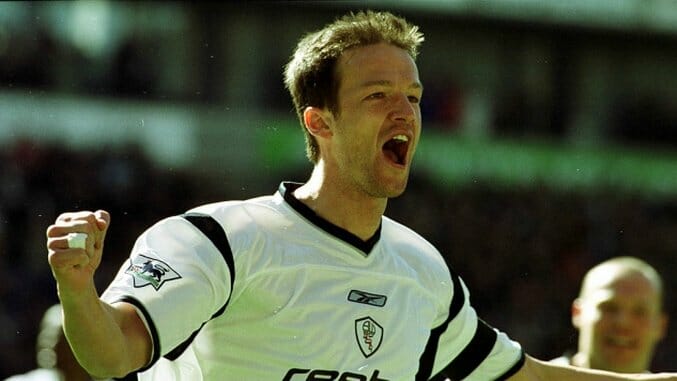Throwback Thursday: Bolton Wanderers v Ipswich Town (April 6th, 2002)
Photo by Dave Tyrrell/Getty
Sam Allardyce has always had something of a Rodney Dangerfield-esque quality to him. A few years ago, he said that he would get more respect from his peers— and be offered more high-profile opportunities for work— if his last name was “Allardici.” The point, more or less, was that his unapologetically direct and defensive style would be more broadly appreciated if he came from continental Europe. That it would be hailed as catenaccio rather than derided as Route One. As it is, and for better or worst, he’s English through and through.
This week the big story has been the bombshell revelations surrounding Allardyce’s meetings with presumed Far East investors and how it forced him out of his job as England manager. This was a job he spent nearly three decades working toward, and being appointed to the job this past summer represented the summit of his professional life. It’s unclear where exactly he goes from here, and Allardyce himself admitted he’s not sure if he still has a future in football.
If this is the end of Allardyce’s career in football, it’s worth looking at some of what distinguished him in a fairly small pond.
This week, we look back at April 2002, and the turning point in Bolton Wanderers’ quest to avoid relegation.
Bolton were Allardyce’s first club as a professional player, having come out of their academy system and winning a place in the senior team in 1971. He would play for them for nine years before moving on to Sunderland, and from there to various clubs in England’s first and second division (plus a brief stint with the Tampa Bay Rowdies). He scored 32 goals in his playing career, 21 of which were for Bolton. Which isn’t bad, considering he was a defender.
After he retired he went into managing full time. His first appointment was at Blackpool, where he guided the team to a promotion playoff only to lose in the semifinals to Bradford City and, in so doing, his job. He then moved on to Notts County and earned some success in Division Three but fell out with the chairman over a lack of transfer funds.
When he was appointed manager at Bolton in the middle of the 1999-2000 season, his side were in the bottom half of the Division One table. He ended up securing a promotion playoff spot (losing to Ipswich in the semis) and guided the team to deep runs in both the League Cup and the FA Cup. The next season Bolton once again qualified for the promotion playoffs, made the final, and then beat Preston North End 3-0 to secure promotion to the Premier League.
That first season in the top flight started out pretty well. Bolton won their first three games, leading a cocky Big Sam to declare that his side could very well win the title. Alas, Bolton’s early form wasn’t durable, and by Boxing Day it was clear that they were in a relegation fight.
As the calendar flipped over the April, things were looking desperate for Bolton. They were still teetering on the edge of the drop and set to host fellow bottom-feeders Ipswich Town, knowing that they had to win in order to have any reasonable chance of staying up.
And boy did they deliver. German striker Fredi Bobic, brought in on loan in January from Borussia Dortmund, put Bolton ahead after just 71 seconds.